Dr. William Kiernan (ICI UCEDD/LEND) Testifies Before Senate Subcommittee on Work Incentives Improvement Act
July 16, 2009
Kim E. Musheno
Director of Public Policy
301-588-8252
[email protected]
![]() http://help.senate.gov/Hearings/2009_07_16/2009_07_16.html
http://help.senate.gov/Hearings/2009_07_16/2009_07_16.html

|
| L-R: William Kiernan (Director, ICI), Aaron Bishop (staff of Sen. Enzi (R-WY)) & David Hoff (Senior Technical Assistance Specialist at ICI) |
| Download |
|
|
View the Senate Subcommittee on Employment and Workplace Safety Hearing at the URL above (Dr. Kiernan's testimony appears at minute 95 of the video).
SILVER SPRING, MD - William E. Kiernan, Ph.D., Director of the Institute for Community Inclusion (ICI), a University Center for Excellence in Developmental Disabilities (UCEDD) at the University of Massachusetts, Boston, testified before a Senate employment subcommittee on the reauthorization of the Workforce Investment Act (WIA). He was accompanied by David Hoff, Senior Technical Assistance Specialist at ICI. The hearing was initiated by Senator Patty Murray, Chair of the Senate Health, Education Labor and Pensions (HELP) Subcommittee on Employment and Workplace Safety.
In Dr. Kiernan's oral testimony, he pointed out that the current labor force participation by persons with disabilities (27%) has remained considerably lower than that of the general workforce (71%). The reasons are complex and often tied to limited exposure to the workforce, reduced expectations, lack of access to jobs and competing federal policies regarding the employment potential for persons with disabilities.
With the passage of the Workforce Investment Act in 1998, Kiernan stated there was considerable excitement that the development of the One Stop Career Centers would open up some additional opportunities for individuals with disabilities to enter the workforce. The inclusion into WIA of the long standing efforts and expertise of the public Vocational Rehabilitation system through Title IV of the Act further expanded the potential for a seamless, universally designed system of employment and training. However, a number of limitations in the implementation of the law as well as initial competition among agencies contributed to a slow start in efforts to engage all customers in the workforce.
Dr. Kiernan provided the following recommendations to be considered to improve and strengthen the Workforce Investment Act:
- Retain the universal aspects of the law;
- Expand the ongoing investment of ETA and Office of Disability Employment Policy (ODEP) in supporting increased employment opportunities for persons with disabilities;
- Adopt performance measures that document effectiveness yet do not penalize One Stops from serving all job seekers;
- Create more effective partnerships with mandated and non-mandated partners addressing employment of all customers, including those with disabilities;
- Eliminate the infrastructure requirement and the development of agreements stipulating the sharing of personnel, expertise and resources across mandated partners and the One Stops;
- Develop more streamlined structures (integration of the employment service and the One Stops in all states) and the development of more uniform application and reporting requirements across all WIA partners;
- Create a more comprehensive transition to work and adult life for youth with disabilities including WIA and other resources at all levels;
- Engage One Stops as Employment Networks for the Ticket to Work program; and
- Increase the capacity of current and future workforce staff to serve all job seekers.
- Utilize the national network of University Centers for Excellence to provide training and technical assistance to One Stops and employment professionals.
The adoption of these recommendations will allow WIA to more effectively embrace the intent of Congress to have a universal and seamless employment and training system that addresses the needs of all job seekers as well as all employers.
The Honorable Jane Oates, Assistant Secretary of Labor, Employment and Training Administration (ETA) and the Honorable Martha Kanter, Under Secretary of the U.S. Department of Education also testified before the subcommittee, among other stakeholders in the workforce investment system.
AUCD looks forward to working with the Committee to develop and move a bill to reauthorize WIA in this session of 111th Congress.
The Association of University Centers on Disabilities, located in Silver Spring, MD, is a national, non-profit organization that promotes and supports the national network of interdisciplinary centers advancing policy and practices through research, education and services for and with individuals with developmental and other disabilities, their families, and communities. UCEDDs are national leaders in a constellation of activities designed to improve employment options and outcomes for people with developmental and other disabilities.
###







